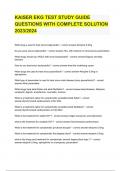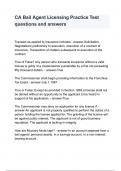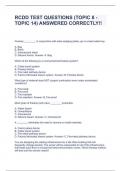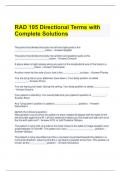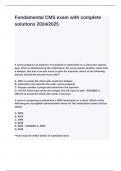TEST 3 STUDY NOTES
SEMESTER 2
TOPIC 1: BILL OF RIGHTS
Structure of the Bill of Rights
Section 7 (Rights)
o Refers to the rights and values contained in the Bill of Rights
o Refers to State's duty to protect and promote the spirit, objects and purport of the Bill of
Rights
o Includes the limitation of the rights
Section 8 (Application)
o The Bill of Rights is above all law
o Binds all natural and juristic persons
o Refers to the powers of the courts when applying the Bill of Rights
SECTION RIGHT
s9 Equality
s10 Human Dignity
s11 Life
s12 Freedom of bodily integrity
s13 Slavery, Servitude, Forced Labour
s14 Privacy
s15 Freedom of religion, belief, opinion
s16 Freedom of expression
s17 Assembly, demonstration, picket, petition
s18 Freedom of association
s19 Political Rights
s20 Citizenship
s21 Freedom of movement and residence
s22 Freedom of trade, occupation and profession
s23 Labour relations
s24 Environment
,s25 Property
s26 Housing
s27 Healthcare, food, water, social security
s28 Children
s29 Education
s30 Language and Culture
s31 Cultural, religious and linguistic communities
s32 Access to information
s33 Just administrative action
s34 Access to courts
s35 Arrest, detained and accused persons
Section 36 (Limitation of Rights)
Section 37 (State of Emergency)
Section 38 (Enforcement of Rights)
o includes 5 categories of people who can approach the courts
o what courts must do when rights are infringed
Section 39 (Interpretation of the Bill of Rights)
o what court must do and consider
Rights vs Values
Rights
o relied on and used to challenge constitutionality
Values
o Interpretation and limitation of rights
Values
S7 (Rights)
o provides what the values are
s36 (Limitation of Rights)
, o values can be used to determine if the limitation is reasonable and justifiable
s39 (Interpretation of the Bill of Rights)
o must use values to interpret rights
Stages of Bill of Rights Litigation
1. Procedural
Before case is heard
Decides on whether or not it will be heard
2. Substantive
Whether or not a right has been infringed
3. Remedies
Order a remedy for any infringement
Procedural Stage
Does the victim have the protection of the Bill of Rights?
Can the claimant approach the court?
Is the perpetrator bound by the Bill of Rights?
Does the bill of Rights apply directly or indirectly?
Does the victim have protection?
o Section 10 (Human Dignity)
1. everyone has inherent dignity and the right to have their dignity respected and
protected
o Section 11(Life)
1. everyone has the right to life
o Some rights are limited to citizens
1. Section 19 (political rights)
, 2. Section 20 (citizenship)
3. Section 21 (freedom of movement and residence)
4. Section 22 (freedom of trade, occupation and profession)
o Some rights are limited to workers
1. Section 23 (labour relations)
o Some rights are limited to children
1. Section 28 (children)
o Some rights are limited to arrested, detained and accused
1. Section 35 (arrested, detained and accused persons)
o Natural v Juristic persons
1. Section 8 (Application)
2. S8(4)
A juristic person is entitled to the rights in the Bill of Rights to the extent
required by the nature of the rights and the nature of the juristic person
3. They have some rights
4. Test: Nature of the right and Nature of the juristic person
Can the claimant approach the court?
o Section 38 (Enforcement of rights)
a) anyone acting in their own interest
b) anyone acting on behalf of another person who cannot act in their own name
c) anyone acting as a member of, or in the interest of, a group or class of persons
d) anyone acting in the public interest
e) an associate acting in the interest of its members
Is the "perpetrator" bound by the Bill of Rights?
o section 7(2)
the state must respect, protect, promote and fulfill the rights in the Bill of Rights


